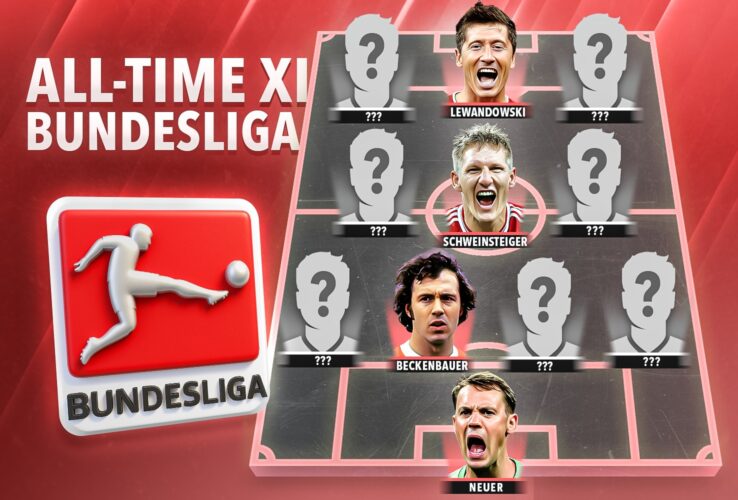Since its formation in the 1960s, the Bundesliga has played host to generations of world-class talents.
From Bayern Munich’s repeated dominance to Dortmund’s golden years and the occasional rise of challengers like Hamburg, Bremen and Stuttgart, the league’s history is rich with players who have set standards across Europe.
This all-time XI recognises those players who have defined the league and prioritises individual performances over collective success, although all of the players have stacked trophy cabinets.
GK: Manuel Neuer
Between Sepp Maier, Oliver Kahn and Manuel Neuer, Germany has produced three era-defining goalkeepers, but Neuer takes the nod.
Having emerged from the Schalke academy, Neuer made his move to Bayern in 2011 and has revolutionized the position. His control of the defensive line, sweeping ability and confidence on the ball altered what was expected from goalkeepers worldwide.
Across nearly 500 Bundesliga appearances, he has won multiple titles and clean sheet records while maintaining a near-decade of dominance. His presence and consistency made him not just a Bayern legend, but a defining figure of the Bundesliga era.
LB: Paul Breitner
Similar to Neuer, Breitner redefined his position.
Equally effective in defence and attack, Breitner was among the first forward-thinking full-backs, something that is synonymous with the modern game.
A five-time league winner with Bayern, his partnership with Karl-Heinz Rummenigge earned its own nickname, ‘Breitnigge’.
Breitner is often looked back on as ahead of his time with his role and continues to set the benchmark.
CB: Franz Beckenbauer
No discussion of Bundesliga history exists without Franz Beckenbauer.
Beckenbauer’s emergence in the mid-1960s changed the role of the defender entirely. As the prototype sweeper, he blended elegance with efficiency, launching attacks from deep and dictating tempo with precision.
Nearly two decades of his career were spent at Bayern. As the primary example of a centre-back/midfielder hybrid, Beckenbauer won three consecutive European cups, four Bundesliga titles and is part of an exclusive club to have won the World Cup as player and manager.
Having played alongside Pelé at the New York Cosmos, Beckenbauer has left a legacy that transcends football culture, and has a strong case as the best player in this eleven.
CB: Mats Hummels
Mats Hummels represents the modern evolution of the Bundesliga centre-back – calm on the ball, tactically alert and physically commanding.
Starting at Bayern before establishing himself at Borussia Dortmund, Hummels became the heartbeat of one of the most successful Bundesliga sides outside Munich. His leadership and distribution were central to Dortmund’s consecutive league titles under Jürgen Klopp.
With over 500 Bundesliga appearances and sustained excellence at both clubs, Hummels remains a symbol of the league’s balance between structure and technical quality.
RB: Philipp Lahm
Philipp Lahm set a standard that few full-backs worldwide have reached.
Technically flawless and tactically versatile, Lahm was comfortable on either flank and often deployed in midfield later in his career. His understanding of positional play underpinned Bayern and Germany’s dominance throughout the 2010s.
Lahm’s Bundesliga career – over 500 appearances, eight league titles and unmatched consistency – defined what professionalism looks like in the modern German game.
CM: Bastian Schweinsteiger
Initially a wide player, he developed into one of the league’s most complete central midfielders.
Schweinsteiger’s control, pressing intelligence and range of passing epitomised the tactical and physical demands of German football during its modern peak.
His longevity and influence, from the mid-2000s through to his final domestic seasons, helped set the tone for a generation of Bundesliga midfielders.
CM: Lothar Matthäus
Lothar Matthäus is arguably the Bundesliga’s most complete outfield player.
Across stints with Borussia Mönchengladbach, Bayern Munich and later Inter Milan, his time in Germany was defined by dominance at both ends of the pitch. Dynamic, physical and technically elite, Matthäus transitioned seamlessly from an attacking midfielder to a deep-lying playmaker and eventually a sweeper.
With over 460 Bundesliga appearances and a Ballon d’Or to his name, Matthäus embodied the league’s mix of tactical intelligence and relentless drive.
AM: Thomas Müller
Thomas Müller is the Bundesliga’s most consistent attacking presence of the modern era.
His understanding of movement and space – the self-created “Raumdeuter” role – has produced unmatched productivity. With more than 150 Bundesliga assists, Müller is the league’s record provider, combining timing, intelligence and adaptability across multiple managers and systems.
He has bridged generations, maintaining elite output for over a decade while defining the professionalism and tactical precision that characterise modern Bundesliga football.
FW: Gerd Müller
Gerd Müller remains the benchmark for Bundesliga forwards.
With 365 goals in 427 league appearances, his efficiency redefined finishing standards in German football. Compact, instinctive and relentlessly sharp inside the box, Müller turned half-chances into certainties.
His scoring record stood for nearly half a century, shaping how strikers were judged and trained across the country. Every Bundesliga goalscorer since has lived in his shadow.
FW: Robert Lewandowski
Robert Lewandowski’s consistency and professionalism transformed what it meant to be a Bundesliga forward in the modern era.
After breaking through at Dortmund, his move to Bayern elevated him to world-class status. He scored 312 Bundesliga goals – second only to Gerd Müller – and won the league in every season he spent in Munich.
Lewandowski’s blend of physical strength, technical sharpness and relentless finishing made him the defining Bundesliga striker of the 2010s and early 2020s.
FW: Arjen Robben
Arjen Robben’s impact on the Bundesliga was immediate and enduring.
Over a decade in Germany, he became synonymous with one of the most recognisable attacking patterns in football – cutting inside from the right to finish with his left. Defenders knew what was coming but could rarely stop it.
Beyond his trademark style, Robben’s professionalism and match-winning record left a lasting mark on Bundesliga standards for wide forwards.
A foreign import who fully defined a German era.













